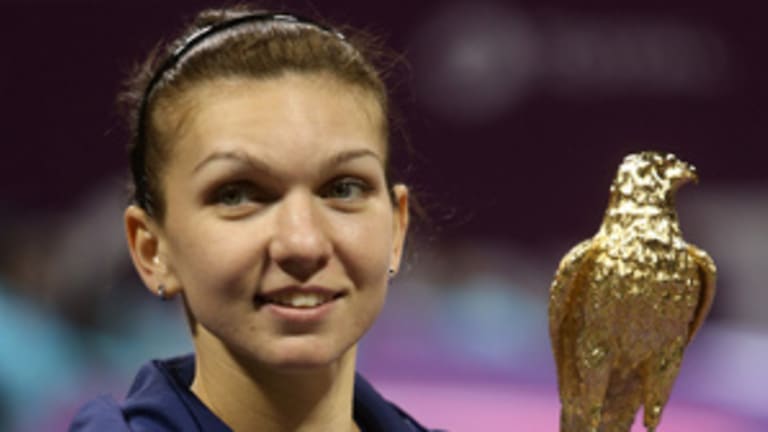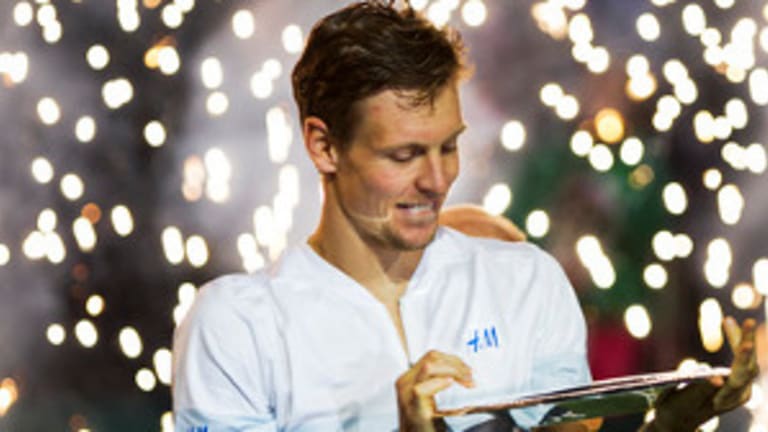It’s a rare week in tennis when we’re not confronted with the question of whether a certain young or improving player is “for real” or not. So far in 2014, we’ve already asked it of Dominika Cibulkova, Eugenie Bouchard, Nick Kyrgios, Dominic Thiem, Gael Monfils, and Stanislas Wawrinka—though in Stan’s case, it doesn’t get much more real than winning a Grand Slam. Basically, the first thing we say when any player wins anything is: “Can he or she do it again?” That includes Wawrinka. It was only a few minutes after his breakthrough in Melbourne that he was asked, "Can you win the Aussie-French double?"
Now it’s time to ask the for-real question of Simona Halep. Last week in Doha, the 22-year-old Romanian had the run of her life so far, as she made straight-set work of three players in the Top 10, Sara Errani, Agnieszka Radwanska, and Angelique Kerber, on her way to winning the biggest tournament, and biggest paycheck, of her career. The title puts Halep at No. 9 in the WTA rankings and No. 3 in the 2014 race to the season-ending championships in Singapore.
So is Halep for real? More specifically, is she more real than Bouchard and Cibulkova, each of whom has been suffering from an Aussie Open hangover this month—Cibulkova lost two Fed Cup matches for Slovakia and retired early last week in Doha; Bouchard lost in the qualies in Dubai this weekend. Is Halep more real than her fellow fast-riser from 2013, Sloane Stephens, who also went out early in Doha and Dubai and has suffered a rankings drop this year?
Despite her big win this weekend, Halep’s overall performance in 2014 doesn’t offer much of a guide. She lost her openers in Sydney and Paris, and while she reached her first Grand Slam quarterfinal in Melbourne, Halep was destroyed by Cibulkova when she got there.
“When I started the year I was a little bit afraid that I lose my confidence, especially when I lost first round in Sydney,” Halep said yesterday. “But I came back mentally. I really found my way to play. I’m mentally strong again now, I’m playing aggressive again, and I’m having that pleasure on the court again. Being relaxed and enjoying myself on the court was the secret to my success.”
For now, it’s probably best to table the discussion of Halep’s future. She gets no rest this week in Dubai, where she’ll play Alize Cornet in the first round. The next step is to get her ranking high enough so she gets a bye at events like these.
What we can talk about is what Halep does well, and how she outclassed her higher-ranked opponents so thoroughly in Doha. Here are a few of the notes I wrote down while watching Halep play Kerber in the final on Sunday.
—She’s tennis's William of Ockham. Roughly speaking, he said that the simplest answer is usually the right one. For Halep, the simplest way to win a point is the right one. She can’t belt winners at will, which may actually help, because she has to create her chances other ways.
—Plays with straightforward sense of purpose. I once described Djokovic’s game as “uncluttered.” The word also comes to mind with her. Halep’s strokes aren’t fancy, but she knows what she needs to do and doesn’t second-guess herself. When she sees a short ball, she gets to it at the top of the bounce and hits it into the open court.
—Yet she can play with disguise, especially on the backhand side.
—Good power and angle crosscourt with the backhand. Ability to roll over her forehand for dipping topspin on passing shots. She's not complicated, but she's not one-dimensional, either.
—Good mover, which she needs to be at 5’7”; anticipation and court sense also top-notch.
(She may be a better mover than I realized. This is what Radwanska had to say about playing Halep: “At one point, I didn’t know what to do to end the point, because she was everywhere.”)
—Kerber, who struggles in finals, struggled all day in this one and gave away the last game. But I got the sense that Halep would have been OK closing it out on her own. That’s the benefit of winning six tournaments last year. Unlike, say, Stephens, who has never won a WTA event, Halep expects to win them now, and knows she can.
All of that is certainly real enough, though it's not clear whether Halep has the one thing that all women’s Grand Slam winners must have: The ability to pound winners from the baseline.
But putting pressure on herself to take giant steps doesn’t seem to be her way. As Halep has said many times, she wins when she’s enjoying herself.
“I think I can I play at a higher level now,” Halep says. “I believe in my chances and I believe in my game. I feel confident. Now maybe it’s possible I can make the semiifinals of a Grand Slam.”
She’s been to the quarterfinals of a Grand Slam; she thinks she can make the semis. That sounds like a real-istic goal to me.

